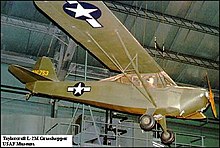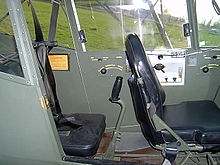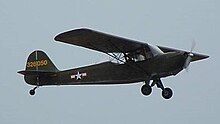Taylorcraft L-2
| L-2 Grasshopper | |
|---|---|
 Taylorcraft L-2M of the Commemorative Air Force | |
| General information | |
| Type | Observation and liaison |
| National origin | United States |
| Manufacturer | Taylorcraft |
| Primary user | United States Army Air Forces |
| Number built | 1,984 |
| History | |
| Introduction date | 1941 |
| Developed from | Taylorcraft D |



The Taylorcraft L-2 Grasshopper is an American observation and liaison aircraft built by Taylorcraft for the United States Army Air Forces in World War II.
Design and development
In 1941 the United States Army Air Forces ordered four Taylorcraft Ds with the designation YO-57. They were evaluated in the summer of 1941 during maneuvers in Louisiana and Texas where they were used for support purposes such as light transport and courier. General Innis P. Swift, commander of the 1st Cavalry Division, coined the 'grasshopper' name after witnessing a bumpy landing.[1] This led to a production order under the designation O-57 Grasshopper. In March 1942, the designation was changed to L-2 Grasshopper.
In World War II, the Army Ground Forces began using the L-2 and other liaison aircraft in much the same manner as the observation balloon was used in France during World War I—spotting enemy troop and supply concentrations and directing artillery fire on them. It was also used for liaison (communication) and transport duties and short-range reconnaissance that required airplanes able to land and take off from roads, open fields, and hastily prepared landing strips. The L-2 was primarily used in a training role within the United States and few saw overseas deployment.[2]
Postwar, several L-2s were converted for civilian use and are operated by private pilot owners in the United States as the Model DCO-65. Several are still airworthy in 2021.
The L-2 series meet the standards for light-sport aircraft (other than the L-2M, which has a gross weight rating five pounds over the 1,320-lb limit), thus can be flown by pilots holding the Sport Pilot Certificate.
Variants
- YO-57
- Military version of the Taylorcraft Model D, four for evaluation with a 65hp YO-170-3 and tandem seating, later became O-57 then L-2.
- O-57
- Production version with minor changes and a 65hp O-170-3 engine and tandem seating, 20 built, re-designated L-2 in 1942.
- O-57A
- O-57 with modified cabin and military radios and an observers seat that could face backwards, 336 built, re-designated L-2A
- L-2
- O-57 re-designated in 1942, a further 50 built.
- L-2A
- O-57A re-designated in 1942, a further 140 built.
- L-2B
- L-2A with modifications for artillery spotting with a 65hp Continental A65-8 engine and tandem seating, 490 built.
- L-2C
- 13 Taylorcraft Model DC65 with tandem seating, impressed into Army service.
- L-2D
- One Taylorcraft Model DL65 with tandem seating, impressed into Army service.
- L-2E
- Two impressed Taylorcaft Model DF65s with a 65hp Franklin 4AC-176-B2 and tandem seating into Army service.
- L-2F
- Seven impressed Taylorcraft Model BL65s with side-by-side seating and a 65hp O-145-B1 engine, one originally designated UC-95.
- L-2G
- Two impressed Taylorcraft Model BFs with side-by-side seating and a 50hp Franklin 4AC-150-50 engine.
- L-2H
- Nine impressed Taylorcraft Model BC12-65s with side-by-side seating and a 65hp Continental A65-7 engine.
- L-2J
- Five impressed Taylorcraft Model BL12-65s with side-by-side seating and a 65hp O-145-B1 engine.
- L-2K
- Four impressed Taylorcraft Model BF12-65s with side-by-side seating and a 65hp Franklin 4AC-176-B2 engine.
- L-2L
- Single impressed Taylorcraft Model BF60 with side-by-side seating and a 60hp Franklin 4AC-171 engine.
- L-2M
- L-2A with close-fitting engine cowls and wing spoilers and tandem seating, 900 built.
- TG-6
- Model ST.100 three-seat training glider variant with enlarged fin area, wing spoilers and a simpler landing gear, 250 built.
- LNT-1
- U.S. Navy version of TG-6
- XLNT-2
- Modified LNT-1 for Glomb trials.[3]
- UC-95
- One impressed Taylorcraft Model BL65s with side-by-side seating and a 65hp O-145-B1 engine, re-designated L-2F.
Operators
Airworthy Aircraft
- 43-25823 - L2M operated by the Commemorative Air Force.
- 43-26050 - L-2M operated by the Texas Air Museum in Slaton, Texas.

L-2M flying with the Texas Air Museum in Slaton, Texas.
Aircraft on display
- 42-35872 – L-2A on static display at the US Army Aviation Museum in Fort Novosel, Alabama.
- 43-26110 – L-2M on static display at the Pima Air & Space Museum in Tucson, Arizona.[5]
- 43-26433 – L-2M on static display at the Aerospace Museum of California in McClellan, California.[6]
- 43-26592 – L-2M on static display at the National Museum of the United States Air Force in Dayton, Ohio.[7]
- 43-26104 – L-2M on static display at the Alaska Aviation Museum in Anchorage, Alaska.
L-2 on display at the Fargo Air Museum, in Fargo, North Dakota.
Specifications (Taylorcraft L-2A)

Data from Pilots Flight Operating Instructions, Army Model L-2, L-2A, L-2B, and L-2M Airplanes, T.O. No. 01-135DA-1, 1944 & The Taylorcraft Story, 1992
General characteristics
- Crew: Two, pilot and observer
- Capacity: 425 lb (193 kg)
- Length: 22 ft 9 in (6.9 m) [8]
- Wingspan: 35 ft 5 in (10.8 m) [8]
- Height: 6 ft 8 in (2.0 m) [8]
- Wing area: 181 sq ft (16.8 m2) [8]
- Airfoil: NACA 23012[9]
- Empty weight: 875 lb (397 kg) [8]
- Gross weight: 1,300 lb (590 kg) [10]
- Max takeoff weight: 1,300 lb (590 kg) [10]
- Powerplant: 1 × Continental O-170-3 4-cylinder air-cooled engine, 65 hp (48 kW)
Performance
- Maximum speed: 92 mph (148 km/h, 80 kn) [11]
- Cruise speed: 83 mph (134 km/h, 72 kn) at 2,150 rpm[11]
- Stall speed: 43 mph (69 km/h, 37 kn) power on[12]
- Never exceed speed: 140 mph (225 km/h, 120 kn) [13]
- Range: 303 mi (488 km, 263 nmi) at 2,000 rpm
- Service ceiling: 12,000 ft (3,658 m) [14]
- Rate of climb: 395 ft/min (2.01 m/s) L-2A[15]
- Wing loading: 7.18 lb/sq ft (35.1 kg/m2)
Avionics
- RCA AVR-20A radio[16]
See also
Aircraft of comparable role, configuration, and era
- Taylorcraft Auster
- Piper J-3 Cub and its L-4 military version
Related lists
References
Citations
- ^ *Graff, Cory (2003). Shot to Hell: The Stories and Photos of Ravaged WWII Warbirds. St. Paul, MN: MBI Publishing Co. ISBN 0-7603-1609-0.
- ^ Raines, Edgar F. (2000) Eyes of Artillery:The Origins of Modern U.S. Army Aviation in World War II; Government Printing Office; ISBN 9780160503436
- ^ Ordway and Wakeford 1960, p. 180.
- ^ Moulin, Jacques. "Les Taylorcraft L- 2 de la Marine française". Les avions de la guerre d'Algérie. 2013. Retrieved 31 October 2020.
- ^ "Taylorcraft L-2M Grasshopper". Pima Air & Space Museum. Retrieved 3 November 2020.
- ^ "Taylorcraft L-2M Grasshopper". Aerospace Museum of California. Archived from the original on 17 April 2016. Retrieved 3 November 2020.
- ^ "Taylorcraft L-2M Grasshopper". National Museum of the United States Air Force. 17 April 2015. Retrieved 3 November 2020.
- ^ a b c d e Love 2001, p. 20.
- ^ The Taylorcraft Story 1992, p. 20.
- ^ a b Pilots Flight Operating Instructions, Army Model L-2, L-2A, L-2B, and L-2M Airplanes, T.O. No. 01-135DA-1 1944, p. 5.
- ^ a b Pilots Flight Operating Instructions, Army Model L-2, L-2A, L-2B, and L-2M Airplanes, T.O. No. 01-135DA-1 1944, p. 29.
- ^ Pilots Flight Operating Instructions, Army Model L-2, L-2A, L-2B, and L-2M Airplanes, T.O. No. 01-135DA-1 1944, p. 11.
- ^ Pilots Flight Operating Instructions, Army Model L-2, L-2A, L-2B, and L-2M Airplanes, T.O. No. 01-135DA-1 1944, p. 12.
- ^ The Taylorcraft Story 1992, p. 151.
- ^ Pilots Flight Operating Instructions, Army Model L-2, L-2A, L-2B, and L-2M Airplanes, T.O. No. 01-135DA-1 1944, pp. 26-28.
- ^ Pilots Flight Operating Instructions, Army Model L-2, L-2A, L-2B, and L-2M Airplanes, T.O. No. 01-135DA-1 1944, pp. 18-20.
Bibliography
- Pilots Flight Operating Instructions, Army Model L-2, L-2A, L-2B, and L-2M Airplanes, T.O. No. 01-135DA-1. Wright-Patterson AFB, Ohio: US Army Air Forces. 1944.
- Peek, Chet (1992). The Taylorcraft Story. Norman, OK: Three Peaks Publishing.
- Ordway, Frederick Ira; Ronald C. Wakeford (1960). International Missile and Spacecraft Guide. New York: McGraw-Hill. ASIN B000MAEGVC.
- Love, Terry M. (2001). L-Birds: American Combat Liaison Aircraft of World War II. New Brighton, MN: Flying Books International.
